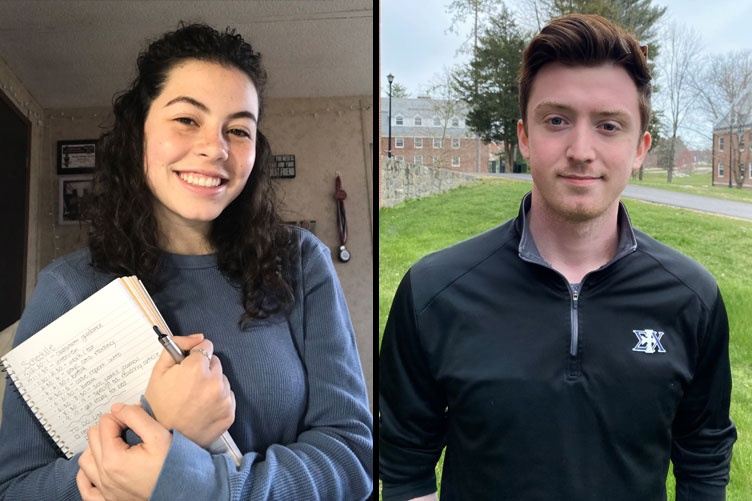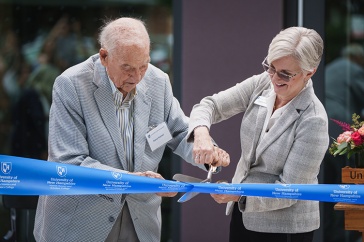
Jacob Claire ’21 was working at the contact center for Service Credit Union and had planned to work from home when COVID-19 hit. But he ran into technical difficulties and wasn’t able to continue.
Being without a job meant worrying not only about groceries, rent and utilities, but also about his health. Late in his freshman year, the New Hampshire native was diagnosed with Crohn’s disease. And while he and his doctors are managing his case, last month he learned he needed a test that his insurance wouldn’t cover up front. Suddenly, he was looking at a $400 expense on top of all his regular weekly expenses.
“This is really geared toward students who, through no fault of their own, don’t have the safety nets that others might have.”
“I haven’t been working, I just didn’t have the money, and I didn’t want to hold off on it,” says Claire, who is majoring in business administration with a finance option. “I’m trying to do everything I can now to make sure I stay healthy and to take my disease very seriously.”
Claire is one of dozens of students who have received help from the university's new Student Emergency Assistance Fund, supported entirely through the generosity of donors. Since the onset of the coronavirus, more than 200 people have made donations — faculty, staff, parents, alumni and current students, as well as a $25,000 matching gift from Morgan Rutman ’84, and his wife, Tara. Awards typically range from $100 to $500 and can be used for such things as emergency travel, medical costs, safety and security needs, auto repairs and academic supplies.
Claire said he received the funds in his UNH account on a recent Friday and was able to complete the test the following week.
“At first I really didn’t feel comfortable taking money from people; I always felt like you earn your keep, and I didn’t earn this money,” Claire says. But he’s glad he did. “This goes beyond COVID-19. People who give to this fund are helping a kid with a disease that he doesn’t know that much about. I want to thank them for getting me pointed in the right direction, so I can be as healthy as possible.”
Ted Kirkpatrick, senior vice provost for student life and dean of students, is running the emergency assistance program and says that each day his inbox is fresh with new requests for help.
“This is the first time we’ve had this kind of support for students in crisis,” he says. “This is really geared toward students who, through no fault of their own, don’t have the safety nets that others might have.”
For now, Claire is continuing his coursework through Paul College, and is excited about his changing role in his fraternity, Sigma Chi, where he was scholarship chair. But a recent online meeting with the president offered a new opportunity: health and wellness chair for the remainder of the semester. He’ll be giving brothers ideas on how to manage their time, and how to stay physically and mentally healthy while being isolated. “I know some brothers are handling it well, but others might not be, and I want to help them,” he says.
He says he’s “extremely grateful” for the help he’s received through the university’s emergency fund and its donors.
“This just made me feel like out of all the worst-case scenario things that have happened, this was a little bright light in the darkness. It made me feel a little better,” Claire says.
When Jamila Peguero '21 learned UNH Manchester would be switching to remote learning in the wake of the spreading COVID-19 crisis, she knew that meant she’d no longer be working at the university library, where she holds down a part-time job.
It’s okay, she figured. She’d go back to substitute teaching and working at an afterschool program to help make ends meet. But then schools started to close — first for two weeks, then for two more. Then came stay-at-home orders, and school closures into May. As someone who contributes to her family’s household costs and pays many of her own expenses, she started to panic.
“Those other jobs were my last resort; typically, I have two jobs at a time to stay afloat,” Peguero explains. “All of a sudden, I lost all of my jobs.” She says in these extraordinary times, there’s no shame in asking for assistance. “I mean, we all need help, right? It’s really important to put yourself out there, to think ‘this is something that I need, and it’s okay.’”
Peguero continues to look for part-time work and says in the meantime, she’ll use the Emergency Assistance Fund money to buy groceries for her family (she lives in Sandown with her mother, sister and grandmother) and to get her car inspected this month. She’s also looking into increasing her Internet speed on her home Wi-Fi, because it’s not working very well, and she needs it for her online classes.
Once she graduates with her psychology degree, Jamila plans to pursue a master’s degree so she can work in elementary education. As an active member of the UNH Manchester Peer Assistant Leaders program, she’s usually busy thinking of how she can support her fellow students and help them acclimate to college life through better time management skills, stress relief and coping tactics. So it was a change when she realized she was the one who needed help this time.
“I just want donors to know how much this means to me, and how much they have helped me,” she says. “This is really amazing, so thank you.”
To make a gift to the Student Emergency Assistance Fund, please visit unh.edu/helpstudents
-
Written By:
Michelle Morrissey ’97 | UNH Magazine | michelle.morrissey@unh.edu
















































